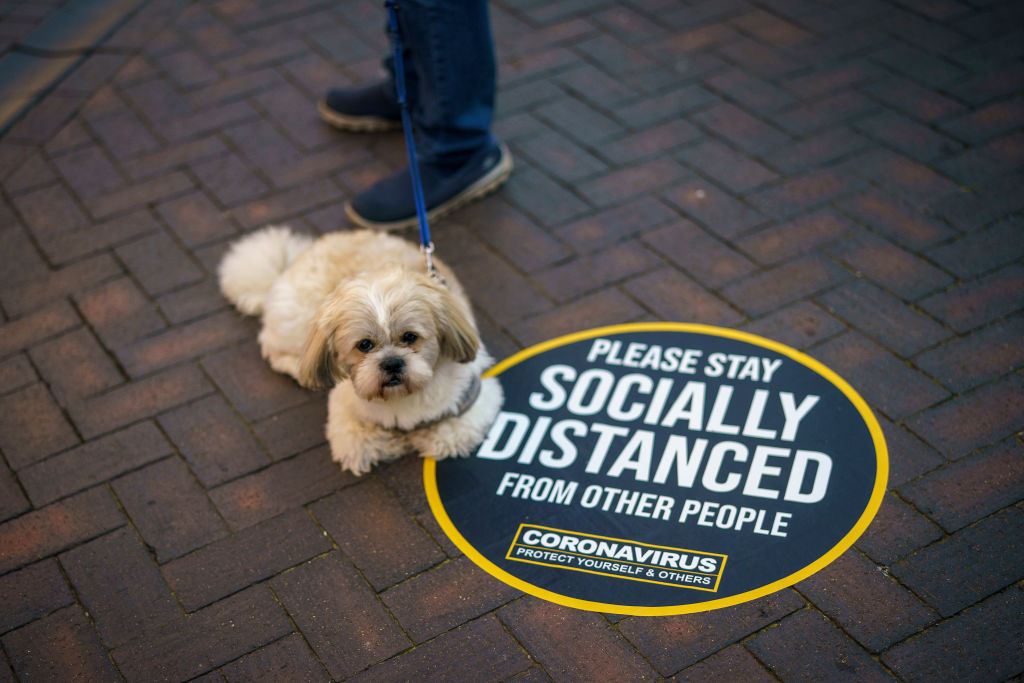
Who let the dogs out?
Apparently, researchers and doctors around the world have literally let the dogs out to help stop the spread of the coronavirus COVID-19 By sniffing out the virus, much like drug-sniffing dogs have done for decades at airports and events, more dogs are being trained to be on the front lines.
As AmericanAirlines Arena in Miami reopened to a limited number of fans Thursday, the Miami Heat brought out dogs they label as "coronavirus detection dogs" to screen guests and employees as they arrive at the facility. The team will be the first in the NBA to use canines to screen the public.
The science isn't yet clear whether dogs can, in fact, detect coronavirus infection in people. The team has been trying the dogs out on a smaller scale to screen personnel -- and "we learned a lot during that time," Matthew Jafarian, Miami Heat's executive vice president for business strategy, told CNN.
Here's how the Miami Heat says the dogs work: Fans will line up in a screening area on socially distanced dots, keeping their hands at their sides. The dogs will walk past each person, sniffing them. If the dog keeps walking, you are clear to enter the arena.
If the dog sits next to you, the Miami Heat says, that signals to the handler that it might have detected Covid-19. A staff member will then help you and your party with a refund, and provide additional health and safety information -- but you and your party will not be allowed to enter the arena.
When asked about the research not being definitive yet, Jafarian responded that he originally was skeptical, but found the studies "compelling" because they reached similar results. He said that the Miami Heat is taking its dog program "very slowly" until it learns more.
COVID-Sniffing Dogs Research Around the World
The Miami Heat are not alone when it comes to using dogs to stop the spread of COVID. Around the world, canines are being trained to detect the whiff of COVID-19 infections.
International dog trainers are claiming extraordinary results. In some cases, they say that dogs can detect the virus with almost perfect accuracy. Scientists involved with the efforts suggest that canines could help to control the pandemic because they can screen hundreds of people an hour in busy places such as airports or sports stadiums, and are cheaper to run than conventional testing methods such as the RNA-amplification technique PCR.
PCR testing is considered the “gold standard” in SARS-CoV-2 detection. This test actually detects RNA (or genetic material) that is specific to the virus and can detect the virus within days of infection, even those who have no symptoms. The test can be done in a clinic, hospital, or even in your car. Turnaround time is longer, generally in the 2-3 day range but results can be in as little as 24 hours.
But most of the COVID-sniffing dog findings have not yet been peer-reviewed or published, making it hard for the wider scientific community to evaluate the claims. Researchers working on more conventional viral tests say that initial results from dog groups are intriguing and show promise.
In July, researchers in Germany published a pilot study in the journal BMC Infectious Diseases describing how they trained eight dogs to discriminate between saliva samples from someone sick with Covid-19 and a healthy person.
The researchers reported in their study that among 1,012 samples, the dogs correctly identified 157 positive samples and 792 negative samples, but incorrectly identified 33 samples as negative and 30 samples as positive. The dogs "achieved an overall average detection rate of 94%," the researchers wrote.
In December, a separate research team from France and Lebanon published a proof-of-concept study in the journal PLOS ONE detailing how they trained six dogs to tell the difference between underarm sweat from someone who has Covid-19 and someone who doesn't. Some of the dogs had a success rate of 76%, while others had a 100% success rate in that study.
Can my pet get the COVID-19 virus?
According to the Mayo Clinic, while coronavirus disease 2019 (COVID-19) mostly spreads from person to person, it can also spread from people to animals.
COVID-19 is a type of coronavirus. Coronaviruses are a family of viruses. Some cause cold-like illnesses in people, and others cause illness in animals, such as bats. In addition, some coronaviruses infect only animals. While the specific source of origin isn't known, the virus that causes COVID-19 is believed to have started in an animal, spread to humans and then spread between people.
Coronavirus in dogs and cats
According to the U.S. Centers for Disease Control and Prevention, a few pets — including cats and dogs — also have been infected with the virus that causes COVID-19. This happened mostly after the animals were in close contact with people infected with the COVID-19 virus.
Based on the limited available information, the risk of animals spreading the COVID-19 virus to people is considered low. Animals don't appear to play a significant role in spreading the virus that causes COVID-19. There is no evidence that viruses can spread to people or other animals from a pet's skin, fur or hair.








